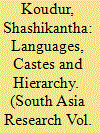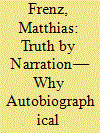| Srl | Item |
| 1 |
ID:
172209


|
|
|
|
|
| Summary/Abstract |
In the former South Kanara or south coastal Karnataka region, the presence of overlapping languages, mainly Tulu and Kannada, posed prolonged dilemmas in the nineteenth century for the Basel Mission. The choice of language was important for their evangelical work, supported by important language-related activities such as dictionary making, grammar writing and translations. Since language use was intertwined with caste hierarchy, this raised issues over the position of lower castes, mainly Billavas, for the native elites and upper castes. This article argues that the prioritisation of Kannada, and relegation of Tulu to a secondary position, was an outcome not only of missionary perceptions of the larger Kannada context, but also more importantly can be traced back to elite representations regarding the subaltern Tulu culture and lifeworld. As missionary intervention in education and native language use challenged the status quo of social hierarchy among local communities, this sparked efforts by the native elites to reclaim and restore the earlier hierarchy. In the process, the native elite representations of Tulu language and culture became at the same time an effort at dismissal and appropriation.
|
|
|
|
|
|
|
|
|
|
|
|
|
|
|
|
| 2 |
ID:
159389


|
|
|
|
|
| Summary/Abstract |
This essay investigates the significance of autobiographical conversion narratives using a case study from the Basel Mission, active in India in the mid nineteenth century. I argue that such narratives are pivotal for the realisation of conversion in the discourse-oriented Protestant mission. Taking up Foucault's idea of ‘regimes of truth’, I understand autobiographical accounts of conversion as ‘acts of truth’. Such acts shape and contribute to a certain discourse formation that has a normative function for the individual and the community involved. The autobiographical conversion narrative thus not only reports events and experiences, it also brings an aura of authenticity and genuineness to the individual conversion, and it reinforces the validity of the norms expressed through the experiences of the subject for the community that subscribes to the discourse.
|
|
|
|
|
|
|
|
|
|
|
|
|
|
|
|